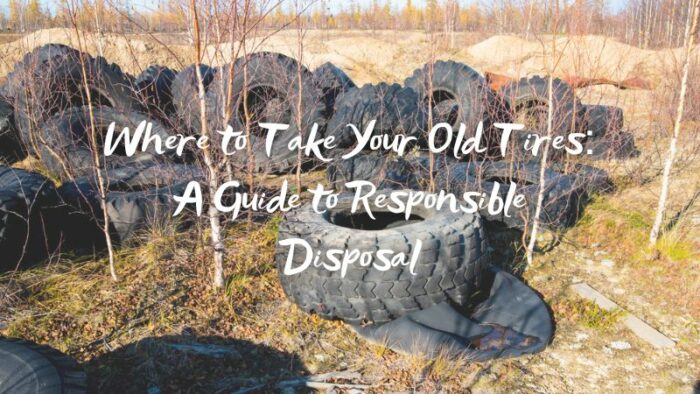It is generally not advisable to put tires in a dumpster. Tires can take up a lot of space and be heavy, making them difficult to dispose of in a dumpster. Additionally, tires are not biodegradable and can take decades to decompose, making them a long-term burden on the environment if they are not disposed of properly.
There are several options for properly disposing of tires. Many tire retailers and auto repair shops will accept old tires for recycling or proper disposal. Some local governments also offer tire recycling or disposal programs, which may be free or low-cost for residents.
In some cases, it may be possible to donate old tires to organizations that can use them for other purposes, such as for use in playgrounds or as barriers in construction sites. However, it is important to check with the organization first to ensure that they can accept the tires and that they are in good condition.
Overall, it is important to dispose of tires responsibly to minimize their environmental impact. Rather than putting tires in a dumpster, recycling or disposing of them through a proper program or donating them to an organization that can use them.
What Happens if You Put Tires in a Dumpster?
If tires are placed in a dumpster, they may not be properly disposed of and can have negative environmental and safety impacts. Tires can take up a lot of space and be heavy, making them difficult to dispose of in a dumpster. Additionally, tires are not biodegradable and can take decades to decompose, making them a long-term burden on the environment if they are not disposed of properly.
If tires are placed in a landfill, they can take up valuable space that could be used for other waste materials. They can also release harmful chemicals into the environment as they break down over time. Tires can also pose a fire risk if not properly stored or disposed of, as they can contain flammable materials and create heat when they break down.
Recycling or disposing of tires through a proper program or donating them to an organization that can use them for other purposes is generally better. This helps minimize their environmental impact and ensures that they are disposed of safely and responsibly.
How to Properly Dispose of Tires
There are several options for properly disposing of tires:
- Recycle them: Many tire retailers and auto repair shops will accept old tires for recycling or proper disposal. The tires can be broken down and used to make new products, such as rubber mulch for landscaping or playgrounds or as a fuel source for industrial processes.
- Dispose of them through a local program: Some local governments offer tire recycling or disposal programs, which may be free or low-cost for residents. These programs often collect and properly dispose of tires to reduce their environmental impact.
- Donate them: In some cases, it may be possible to donate old tires to organizations that can use them for other purposes, such as playground use or as barriers in construction sites. However, it is important to check with the organization first to ensure that they can accept the tires and that they are in good condition.
Overall, it is important to dispose of tires responsibly to minimize their environmental impact. Rather than putting them in a dumpster or leaving them in a landfill, recycling or disposing of them through a proper program or donating them to an organization that can use them.
Where to Recycle Old Tires
Recycling tires is important for both environmental and safety reasons. Old tires can take up valuable space in landfills; if left in stockpiles, they can pose a fire hazard. They can also be harmful to the environment if they are illegally dumped. Fortunately, there are many options available for recycling tires.
One option is to bring your old tires to a tire retailer or auto repair shop. Many of these businesses will accept used tires for a small fee and may even offer discounts on new tires if you bring in your old ones. You can also check with your local waste management company to see if they offer tire recycling services. Some waste management companies will pick up old tires and regular trash for an additional fee.
Another option is to take your old tires to a tire recycling facility. These facilities are specifically designed to handle and recycle tires and may offer a wider range of recycling options. You can search online or call your local government to find out if there are any tire recycling facilities in your area.
Finally, you can also check with local organizations or non-profits that may accept old tires for repurposing or recycling. For example, some schools or community groups may use old tires for playgrounds or landscaping projects or have relationships with organizations that can recycle the tires.

Where to Donate Old Tires
Several organizations may accept donations of old tires for use in various projects or programs:
- Playgrounds: Some organizations, such as schools or parks departments, may use old tires as part of playground structures or surfaces.
- Construction sites: Tires can be used as barriers to protect against erosion or as a temporary fences around a construction site.
- Landscaping projects: Old tires can be used to create raised garden beds or as borders for flower beds.
- Animal enclosures: Tires can create walls or barriers in animal enclosures, such as at zoos or sanctuaries.
Please check with the organization first to ensure they can accept the tires and are in good condition. Some organizations may have specific guidelines for tire donations, such as requiring that the tires be free of damage or be a certain size.
Conclusion
It is generally not advisable to put tires in a dumpster as they can take up a lot of space, is heavy, and have negative environmental impacts if not properly disposed of. Instead, there are several options for properly disposing of tires, including recycling them, disposing of them through a local program, or donating them to organizations that can use them for other purposes. It is important to dispose of tires responsibly to minimize their impact on the environment and ensure that they are disposed of safely and responsibly.

